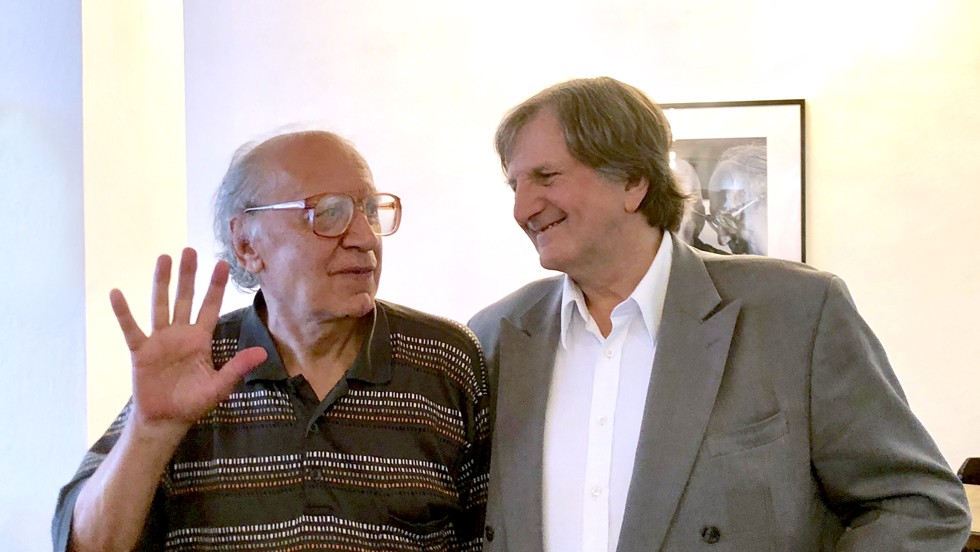
Christopher Lyndon-Gee’s new album is his third featuring the music of the exiled 86-year-old composer.
Music Professor Christopher Lyndon-Gee has a rich, if recent, history with the Ukrainian composer Valentin Silvestrov. His catalog, approaching 100 releases as a conductor, already includes two titles featuring works by Silvestrov, who has reached a newfound prominence with the plight of his homeland. A third one, released in May, is permeated with what Lyndon-Gee calls a melancholy for the past.
In 2016, Professor Lyndon-Gee was invited to conduct the Kyiv Philharmonic. He agreed, subject to one request: that the concert would feature a work by Valentin Silvestrov. Lyndon-Gee knew Silvestrov’s work from recordings but hadn’t had the opportunity to meet the composer or conduct his work. “I was captivated by the beauty of his language and the complexity of his language,” he said, recalling his first encounters with Silvestrov’s music.
Silvestrov was born in Kyiv and “lived his entire life there until just over two years ago, when his daughter Inga dragged him, almost kicking and screaming, away from the dangers of the war,” Lyndon-Gee said. “He didn’t want to leave. He’s deeply unhappy. At 86 years old, you have walked your daily walk on the same streets for eight decades. You know the trees; you address them by name. You know every paving stone; you know every crack in every paving stone. You know the buildings; you know the smells. It’s your city. I mean, this is a tragedy for him to be forced into exile like this.”
Lyndon-Gee knows something of the life of an émigré, although he has followed artistic opportunity rather than fleeing armed conflict. Born in Rome to an Australian father and Italian mother, Lyndon-Gee has lived and worked for long periods in Rome, Amsterdam and Australia, and now divides his time between New York and Vilnius, where he has been a guest conductor for the Lithuanian National Symphony Orchestra since 2013.
The Conductor and the Professor
On the new recording, Lyndon-Gee leads the Lithuanian National Symphony Orchestra in two of Silvestrov’s earlier works, Postludium for Piano and Orchestra and Symphony for Violin and Orchestra “Widmung.” As with much of Silvestrov’s music, he said, a lament for a world that is passing pervades the two pieces.
“This is a man who tells the truth,” he said. “Many composers in all eras, I’m sure, but especially today, seem to want to adopt a persona or fulfill a role. And Silvestrov doesn’t. He’s completely, almost naively open about who he is and what his spirit is telling him. You feel his presence. You feel the history that has happened to him. When I recorded Symphony No. 8, I had an overwhelming feeling throughout, ‘Oh, my God, Valentin knew what was going to happen to his country,’ because you feel the sadness, the tragedy, the violence of the war that was to come. You feel it. And this is who he is. He is at one time the chronicler and the prophet of his own country.”
Lyndon-Gee finds that truth in Silvestrov and puts it into action. The ability to find what resonates with meaning in a piece of music is also what Lyndon-Gee strives to bring to his students—future performers and conductors, composers and educators—in Adelphi’s classrooms.
“When we interview or audition, we tell them what we have heard from our own students who have been through the four-year course and are now graduating,” he said. “The students whom we nurture in our course love that it is such a personally attentive department that cares about them as individuals. I think we offer something very special in the New York area. I really do.”